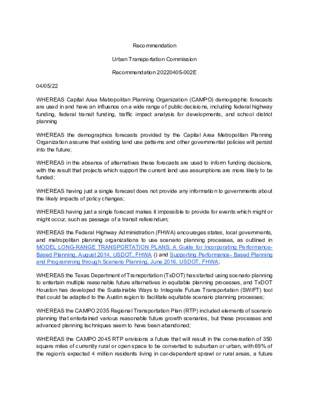Recommendation 20220405-002E: CAMPO Recommendation — original pdf
Recommendation

Recommendation Urban Transportation Commission Recommendation 20220405-002E 04/05/22 WHEREAS Capital Area Metropolitan Planning Organization (CAMPO) demographic forecasts are used in and have an influence on a wide range of public decisions, including federal highway funding, federal transit funding, traffic impact analysis for developments, and school district planning WHEREAS the demographics forecasts provided by the Capital Area Metropolitan Planning Organization assume that existing land use patterns and other governmental policies will persist into the future; WHEREAS in the absence of alternatives these forecasts are used to inform funding decisions, with the result that projects which support the current land use assumptions are more likely to be funded; WHEREAS having just a single forecast does not provide any information to governments about the likely impacts of policy changes; WHEREAS having just a single forecast makes it impossible to provide for events which might or might occur, such as passage of a transit referendum; WHEREAS the Federal Highway Administration (FHWA) encourages states, local governments, and metropolitan planning organizations to use scenario planning processes, as outlined in MODEL LONG-RANGE TRANSPORTATION PLANS: A Guide for Incorporating Performance- Based Planning, August 2014, USDOT, FHWA () and Supporting Performance- Based Planning and Programming through Scenario Planning, June 2016, USDOT, FHWA; WHEREAS the Texas Department of Transportation (TxDOT) has started using scenario planning to entertain multiple reasonable future alternatives in equitable planning processes, and TxDOT Houston has developed the Sustainable Ways to Integrate Future Transportation (SWIFT) tool that could be adapted to the Austin region to facilitate equitable scenario planning processes; WHEREAS the CAMPO 2035 Regional Transportation Plan (RTP) included elements of scenario planning that entertained various reasonable future growth scenarios, but these processes and advanced planning techniques seem to have been abandoned; WHEREAS the CAMPO 2045 RTP envisions a future that will result in the conversation of 350 square miles of currently rural or open space to be converted to suburban or urban, with 69% of the region’s expected 4 million residents living in car-dependent sprawl or rural areas, a future that is distinctly different than the visions articulated through various regional planning processes, such as Envision Central Texas; THEREFORE BE IT RESOLVED, the UTC requests that City Council direct its representatives to the CAMPO Transportation Policy Board to request that CAMPO adopt the following policy changes: ● Use an equitable, scenario-based planning approach, in which CAMPO staff co-create with diverse people from across the region, at least three different forecasts, each one based on a different scenario of possible governmental policy changes or other major factors that could affect demographic forecasting models. ● Provide with every forecast a document describing how the forecasts were derived at a level suitable for reading by Transportation Policy Board members and the general public, such as the one provided for the 2045 forecast. ● Require that the CAMPO Technical Advisory Committee conduct an in-depth review of the methodology used in the forecasts and provide a report on major factors reflecting the accuracy of the forecasts, with the intent to be able to produce a new regional growth forecast as soon as possible, even before adoption of the next Regional Transportation Plan. ● Develop the 2050 Regional Housing and Transportation Plan – instead of a traditional siloed RTP – through robust equitable scenario planning that entertains the possibility of a majority of the region’s residents being able to find affordable options to live in healthy, walkable neighborhoods with access to frequent transit, incorporating the climate, Vision Zero, housing and transportation affordability, multimodal, land conservation, water quality, and flooding goals of the region’s cities and counties into a holistic Regional Housing and Transportation Plan that is resilient in the face of an ever more complex regional growth story. Date of Approval: April 5th 2022 Record of Vote:9-0 with Commissioners Ryan and Driscoll absent Attest: Staff Liaison, Christopher Parks